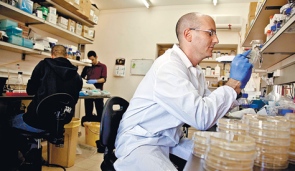
Israeli researchers develop substance that attacks antibiotic-resistant germs
Dan Even
If used on a large scale, their method could change the nature of hospital-acquired infections 'toward being more susceptible to antibiotics rather than more resistant,' say researchers.
Israeli researchers develop substance that attacks antibiotic-resistant germs
If used on a large scale, their method could change the nature of hospital-acquired infections 'toward being more susceptible to antibiotics rather than more resistant,' say researchers.
By Dan EvenIsraeli researchers are laying the groundwork for a spray which they say will make it easier to get rid of the antibiotic-resistant germs that plague hospitals, here and around the world.
If used on a large scale, their method could change the nature of hospital-acquired infections "toward being more susceptible to antibiotics rather than more resistant," the researchers say in an article in this month's issue of Applied and Environment Microbiology, a journal published by the American Society for Microbiology.
 |
Dr. Udi Qimron in his laboratory at Tel Aviv University. Some 1,500 people died of antibiotic-resistant infections in Israel in 2010. |
| Photo by: Nir Kafri |
Lead researcher Dr. Udi Qimron, a microbiologist at Tel Aviv University's Sackler School of Medicine, said their system works by changing the genetic makeup of antibiotic-resistant bacteria - which he said is vital because these germs have proven impossible to eradicate by other means.
"You can kill the bacteria by cleaning with bleach, but you can't kill them 100 percent, and you can't control the secretion of of resistant bacteria, like when a patient sneezes in the [hospital] ward," said Qimron, who worked on the project with the researchers Rotem Edgar, Nir Friedman and Shahar Molshanski-Mor. "Using a substance that moves the bacteria toward susceptibility to antibiotics will prevent resistant bacteria from multiplying on the hospital surfaces."
Some 1,500 people died of antibiotic-resistant infections in Israeli hospitals last year alone - a 7-percent rise since 2009, according to a Health Ministry report released earlier this year. The data do not show whether the infections were actually acquired in the hospital, but previous research indicates that more than two-thirds of infections are transmitted in medical centers, Yehuda Carmeli of the epidemiology unit at Tel Aviv's Ichilov Hospital said after the report came out.
Qimron and the other researchers say their method paves the way for development of a spray that contains the bacteriophages, or bacteria-infecting viruses, they successfully used to render the bacteria sensitive to antibiotics. The spray could be used wherever there are large concentrations of resistant germs, like beds, handrails, door handles, faucets - and, in Israel, the mezuzahs that many Jews touch before entering a room.
The initial research tested a harmless version of the E. coli bacteria, which became sensitive to two kinds of antibiotics - streptomycin and nalidixic acid - after Qimron and his colleagues used bacteriophages to change the genetic makeup of the bacteria.
The researchers are planning to conduct experiments on disease-causing, or pathogenic, strains of bacteria, which is the next step on the way to developing a commercially viable spray to reduce the incidence of resistant germs in hospitals. The spray will be tested first on lab mice and then in local hospitals.
The pathogenic strain of E. coli is liable to cause urinary tract infections in young pregnant women. The infection rate for the antibiotic-resistant Escherichia coli, which is spread primarily outside of medical centers, rose by 11.5 percent among hospitalized patients between 2009 and 2010.
In addition to E. coli, other bacterial infections that are difficult to treat include methicillin-resistant Staphylococcus aureus (also known as MRSA ), Pseudomonas, Acinetobacter and Klebsiella.
There had been a decrease in Klebsiella bacteria infections in Israel, following a national health campaign to tamp down an outbreak. But in May a premature baby died and eight other infants were infected after Klebsiella bacteria was discovered in the neonatal intensive care unit at Sheba Medical Center. The Klebsiella bacterium is carried in the digestive system and may infect patients with weak immune systems, such as premature babies.
In March, the Association of Neonatology said that mortality rates for premature babies in Israel are twice as high as in the West.
A 2010 report by the Health Ministry and the Gertner Institute, an epidemiology research facility, found that 26.7 percent of babies born weighing 1.5 kilograms or less develop a blood infection. Even though there has been a 30-percent drop in such incidents since 2005, the rate remains 50 percent higher than in the United States and Western Europe.
